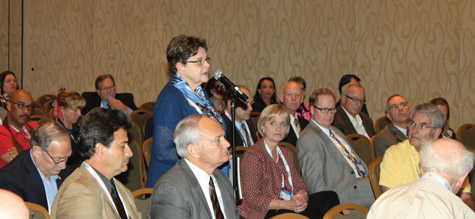AVMA hears calls to end accreditation role
AVMA President Ted Cohn, having heard calls for the AVMA to separate from its college accrediting body, said the Association should consider those arguments.
“I think there’s enough concern there that it’s worth talking about,” he said. If such separation were to occur, he said, that would require careful planning and consideration in a process that would be best carried out by an independent, knowledgeable, thoughtful, and selfless group.
“It’s got to be done in an appropriate fashion and in a way that does not create such a dichotomy between accreditation and the veterinary profession as a whole—that you create an adversarial relationship,” he said.
Dr. Cohn was among about 80 veterinarians at an AVMA Council on Education–hosted “listening session” Jan. 18 at the North American Veterinary Community Conference in Orlando, Florida. The hearing by a four-member panel of council members was a response to a U.S. Department of Education directive that the council show it has broad acceptance by the veterinary profession as an accreditor of veterinary colleges (see story).
Only about a dozen veterinarians spoke, but all had criticism or pointed questions for the council, and half, including a former AVMA president, called for the AVMA and COE to separate. Most comments included at least one of the following allegations: the council applies standards that vary among schools, the AVMA exerts undue influence on the council, and the council receives inadequate resources despite expanding duties. The USDE received similar comments in connection with a December 2014 hearing on continued recognition of the COE as an accreditor.
The four-member panel of council members did not respond, but rather, collected the comments for later discussion.
Dr. Mary Beth Leininger, who was AVMA president from 1996-1997 and was elected in August 2012 to the COE, was among those who told the panel that the council needs to be independent from the AVMA, with its own budget, staff, and legal counsel. She has been absent from council meetings since early 2014. She said in an interview after the January listening session she had been removed because of allegations that her statements in a House of Delegates reference committee session broke the council’s code of conduct and constituted an improper conflict of interest (see story). Her statements were in support of a resolution to discontinue accreditation of veterinary schools outside the U.S. and Canada.

Her removal is under appeal to the AVMA Board of Governors.
In Orlando, Dr. Leininger said that, despite recent efforts to ensure separation, the AVMA has undue influence on the COE by selecting eight members through a volunteer group close to the AVMA Board of Directors. The AVMA House of Delegates used to pick 15 of the 20 council members, but, in 2013, the delegates voted to have the AVMA and Association of American Veterinary Medical Colleges each select eight. The AAVMC used to select one representative.
Before and after the change, the Canadian VMA has selected one member and the council members themselves have selected three public members.
Dr. Leininger also said after the hearing that the council needs to be more transparent about its procedures.
Dr. Frank E. Walker, president-elect of the American Association of Veterinary State Boards and a former COE member, also told the panel he thinks the relationship between the AVMA and COE compromises the council’s independence. Dr. Carl Darby, a small animal practitioner from New York, said in part that the AVMA’s involvement in college accreditation seems to leave the Association unable to advocate for members on that topic.
Dr. John R. Pascoe, the council member who led the meeting, said afterward he had heard similar statements before, although it was good to hear new voices and perspectives. While the calls for further separating the AVMA and AVMA COE will be considered, he said, the council is independent in its operations, additional separation is not required by the USDE, and such a relationship between a professional association and accreditor is not unique.
Dr. Sheila W. Allen, dean at the University of Georgia College of Veterinary Medicine, attended the session and said afterward that she did not feel any AVMA influence on COE activities when she served on the council. She thinks some people were unhappy with past council decisions, but the perceptions that those were made with undue influence from the AVMA are erroneous.
The COE planned to host a similar session Feb. 15 at the Western Veterinary Conference in Las Vegas and another at the AVMA Annual Convention July 10-14 in Boston.
Dr. Cohn said he would like to hear discussion within the AVMA of what an accrediting agency would and should look like if it were designed anew.
Dr. Joseph H. Kinnarney, AVMA president-elect and an attendee of the listening session, also said the session was a positive development. He was the AVMA vice president from 1999-2001, when the Association had talks about how to ensure a “firewall” between the AVMA and council would prevent pressure on the accrediting body by the AVMA Board. He thinks the groups have had such a barrier, but the AVMA continues to change and try to improve.
A transcript of the COE listening session is available here.